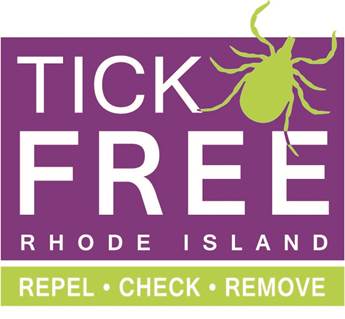

RIDOH, DEM ANNUAL LYME DISEASE PREVENTION
CAMPAIGN URGES RESIDENTS TO AVOID TICK BITES
WHEN OUTDOORS
PROVIDENCE – With the unofficial start of summer arriving, state public health and environmental officials are urging residents to safely enjoy the outdoors, as long as they take the necessary COVID-19 precautions by adhering to public health guidance and to take additional precautions to avoid direct contact with ticks that can transmit Lyme disease.

With a very mild winter in which many more ticks than usual have likely survived until spring and with many more people expected to be outside this year, the Rhode Island Department of Health (RIDOH) and the Department of Environmental Management (DEM) are concerned that 2021 may be a bad year for tick bites and the transmission of Lyme disease and other diseases.
As Rhode Islanders enjoy Rhode Island's outdoors safely, it is also important to be aware of ticks and the diseases they carry. Rhode Island continues to be a high incidence state for Lyme disease. According to 2019 RIDOH disease data, Rhode Island had 971 cases of Lyme disease, with an incidence rate of 91.8 cases per 100,000 people. Reported cases of Lyme disease in Rhode Island increased by approximately 20% in 2017 and has remained at a similar level in 2018 and 2019.
"Summer is a wonderful time to enjoy the outdoors in Rhode Island, but there are also some health risks associated with the season and tick bites are near the top of the list," said Director of Health Nicole Alexander-Scott, MD, MPH. "Rhode Islanders should reduce exposure to ticks, check their bodies for ticks, and remove ticks whenever they are found to help protect against Lyme disease. Lyme disease is a common but frequently misunderstood illness that, if not diagnosed early and treated properly, can cause very serious health problems. But the first step is prevention. All Rhode Islanders can help keep themselves and their family members safe by being tick aware this year!"
Lyme disease is caused by a bacterium transmitted to humans through the bite of an infected tick. An infected tick usually needs to be attached to a person for at least 24 hours to transmit Lyme disease. The ticks that carry Lyme disease can be found in parks, playgrounds, and backyards, but they are most common in very grassy areas and the woods. Ticks can be as small as a poppy seed.
The expected increase in the number of ticks in Rhode Island this year could be attributed to a variety of environmental factors that contribute to climate change, such as increased temperatures and rainfall. Rhode Island's Lyme disease prevention work is part of larger efforts toward building greater community resilience, which will help communities prepare for, respond to, and recover from the adverse health effects of climate change.
“With its elevated temperatures and increased precipitation patterns, climate change could make conditions more hospitable for ticks in the Northeast,” said DEM Director Janet Coit. “That’s why public education is so important — people need to know how to avoid contact with ticks, how to check their body and remove any ticks that are found, and the common symptoms of tick-borne diseases. The attractive, informative materials produced by RIDOH are a wonderful resource, and we’re pleased to make them available for our park and campground visitors.”
RIDOH's ongoing Tick Free Rhode Island campaign highlights the three keys to tick safety: repel, check, and remove.
Repel
Keep ticks off you, your children, and pets by:
o Avoiding wooded and brushy areas with high grass and leaves. If you are going to be in a wooded area, walk in the center of the trail to avoid contact with overgrown grass, brush, and leaves at the edges of the trail. You can also spray your clothes with permethrin to keep ticks away. Make sure to not spray this on your skin.
o Wearing long pants and long-sleeve shirts when outside. o Tucking your pants into your socks so ticks do not crawl under your clothes. o Wearing light-colored clothing so you can see ticks more easily.
Check
Check yourself, your children, and pets, for ticks by:
o Taking a shower as soon as you come inside if you have been in grassy or wooded areas.
o Doing a full-body tick check using a mirror; parents should check their kids for ticks and pay special attention to the area in and around the ears, in the belly button, behind the knees, between the legs, around the waist, and in their hair.
o Checking your pets for ticks as well because they can bring ticks into the home.
Remove
Remove ticks from your body, as well as from children and pets, if you find them.
o Use a set of tweezers to remove the tick. Grasp the tick as close to the skin as possible and pull straight up.
o If you don't have tweezers, use your fingers with a tissue or rubber gloves.
Most people who get Lyme disease get a rash anywhere on their body, though it may not appear until long after the tick bite (70-80% of people with Lyme disease will develop a rash, according to the US Centers for Disease Control). At first, the rash looks like a red circle, but as the circle gets bigger, the middle changes color and seems to clear, so the rash looks like a target bull's-eye.
Some people don't get a rash, but feel sick, with headaches, fever, body aches, and fatigue. Over time, they could have swelling and pain in their joints and a stiff, sore neck; or they could become forgetful or have trouble paying attention. A few people may even have heart problems. Rhode Island's Lyme disease prevention work is part of larger efforts toward building greater community resilience, which will help communities prepare for, respond to, and recover from the adverse health effects of climate change.
The Tick Free Rhode Island campaign features three animated Tick Free Rhode Island videos. The videos show how to repel both ticks and mosquitoes, how to check for ticks, and how to properly remove a tick from the skin. RIDOH's Rhode Island Tick Detective Workbook for Kids is also available online. To view the videos and get more information on Lyme disease and other tick-borne diseases, visit health.ri.gov/ticks.
There are ways for residents to safely enjoy the outdoors, as long as they take the necessary precautions by adhering to public health guidance. For details on safety guidelines, and COVID vaccination visit covid.ri.gov.
-30-













